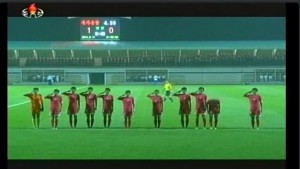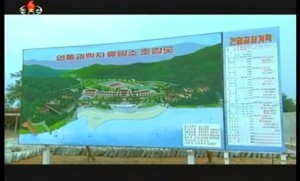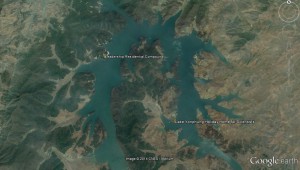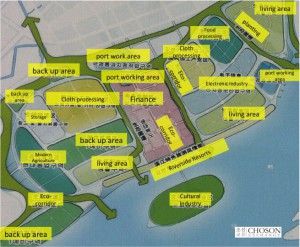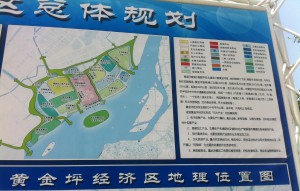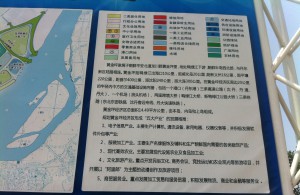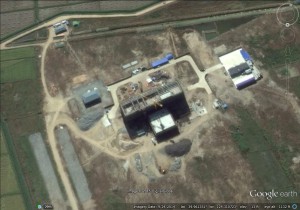DPRK fun: Guess how many members of the women’s team are civilians
September 11th, 2014US federal court rules against DPRK
September 11th, 2014In July 2014 a US federal court found the DPRK guilty of proliferating weapons and providing training to Hezbollah.
DPRK reportedly bans unauthorized wireless networks at foreign embassies
September 9th, 2014According to Itar-Tass (Russia):
North Korean authorities have banned foreign diplomatic missions and branches of international humanitarian organizations working in the country from using any kind of wireless communications without government approval, starting from Monday.
The state department regulating radio frequencies said controls extending to satellite and Wi-Fi were in the interests of national security.
Regulations demand that foreign missions immediately dismantle all equipment providing such means of communication or face penalties including a substantial fine, enforced suspension of those systems and their confiscation.
Officials said foreign representations would be allowed to use equipment only after authorization.
A recent report in The Diplomat claimed that the black market price of housing near the Munsu diplomatic compound had gone up as people sought residencies that could access the internet.
Housing prices have skyrocketed in a residential area of Pyongyang where the foreign embassies are located as North Koreans are scrambling to move to that area, expecting to use the embassies’ Wi-Fi, North Korea Intellectuals Solidarity (NKIS) — a Seoul-based think tank — reported on August 6. The world wide web has long been totally banned in North Korea.
NKIS said the phenomenon became apparent in June when North Korean authorities arrested a broker who enriched himself by facilitating the purchase of housing in that area.
A man with the surname Cho helped people living in Pyongyang’s rich districts such as Central District and Potonggang District sell their houses and move in near the foreign embassies, NKIS reported. It is illegal for people to make real estate deals among individuals.
NKIS added that the reason why North Korean people want to move to the area where the foreign embassies are located is that they are able to use the Wi-Fi coming from the embassies. Since some of embassies have very strong Wi-Fi signals and some don’t even have passwords, people living around the embassies are able to access the Internet using the embassies’ Wi-Fi.
NK News received a copy of the official order from the State Radio Regulatory Department:
All the Diplomatic Missions and International Organizations to
The Democratic People’s Republic of Korea
The State Radio Regulatory Department, Democratic People’s Republic of Korea, presents its compliments to all the Diplomatic Missions and International Organizations to the DPRK and has the honour to inform that the signals of regional wireless network, installed and being used without licence, produce some effect upon our surroundings.
Therefore, it is kindly notified that the regional wireless network is abolished here according to Article 18, Chapter 3 of the Law on Radio Regulation, and that the Missions, who would like to use the regional wireless network in future, should seek a consultation with the State Radio Regulatory Department.
It would be appreciated if the Missions could positively co-operate in the current measures taken for the security of the DPRK.
The State Radio Regulatory Department, Democratic People’s Republic of Korea, avails itself of this opportunity to renew to all the Diplomatic Missions and International Organizations to the DPRK the assurances of its highest consideration.
The State Radio
Regulatory
Department,Democratic People’s
Republic of KoreaPyongyang
August 13,
2014Appendix
Article 18, Chapter 3 of the DPRK Law on Radio Regulation; The institution, enterprise, organization and citizen who would like to form or use the wireless communication network and satellite communication network here should seek the licence from the Radio Regulatory body.
Article 61, Chapter 4 of the enforcement regulations for the DPRK Law on Radio Regulation; In case of having violated this rules and regulations relative to the application of the Law on Radio Regulation, a fine amounting up to 1,500,000 Wons will be imposed , or such punishment as interrupting the operation or forfeiting the equipment will be inflicted according to the circumstances.
Koryolink subscriptions hit 2.4 million
September 9th, 2014Martyn Williams reports that KoryoLink subscriptions have hit 2.4 million.
You can read previous posts on the DPRK’s mobile phone network here.
Kevin Stahler ranks North Korea’s cell phone market penetration here.
Lake Yonphung Holiday Home for Scientists
September 9th, 2014Competition rises among factories and department stores in North Korea: Delivery services now available
September 5th, 2014Institute for Far Easter Studies (IFES)
2014-9-4
It appears that some factories and department stores in North Korea have begun to implement a delivery service in response to customer demand. This new customer-oriented service seems to have arisen out of the Kim Jong Un regime’s goal of increasing autonomy and competition among businesses.
According to the newest issue of “Choguk” [Joguk] (“Motherland”, September 2014), a media outlet associated with the General Association of Korean Residents in Japan, North Korea’s representative state-run department store Pyongyang Department Store No. 1 has been making efforts to diversify the services offered to its customers. The article specifically revealed a personal delivery service, saying, “Salespersons have responded to the public’s requests and have begun to deliver ordered products to sell directly to customers at their doorsteps.”
Salespersons from Pyongyang Department Store No. 1 have also been travelling to power plants, mining sites, textile mills, farms and other worksites to sell products directly to workers and farmers. Other businesses, such as the Potong River Shoe Factory, have also been diversifying customer services. For example, employees now visit customers’ homes to measure shoe size and satisfy other requests they may have when placing an order for shoes.
The Daedong River Passenger Transport Company in Pyongyang is currently offering a taxi dispatching service to customers who call in and request a pickup. Similar to the workings of South Korea’s taxi service, North Koreans may simply dial “186” to be connected to the closest dispatch office, which then sends out a taxi to pick up the customer.
On the other hand, North Korea has recognized the problem of the low-quality products and poor construction work and has emphasized that efforts must be made to remedy these areas. In the most recent issue of the quarterly academic journal, Kyongje Yongu [Economic Research] (2014, Issue 3), one article points out problems in the poor quality of North Korean-made products and construction, saying, “Neglect in quality growth is an outdated attitude.”
Currently, North Korea has undertaken large-scale construction operations to finish the Kim Chaek University of Technology’s faculty apartments, the Pyongyang Orphanage and Nursery, the North Pyongan Chongchon River Power Plant and other projects spanning various fields. The goal is to complete these projects concurrently with the anniversary of the foundation of the Worker’s Party of Korea (October 10).
At construction sites around North Korea, it appears that all available resources are being mobilized to engage in a so-called “speed battle” with these construction deadlines. The side effect of this huge emphasis on speed has resulted in many instances of poor construction, like the collapse of the 23-floor apartment building in Pyongyang’s Ansan-1-dong back in May.
The article also points out, “Despite attempting to work toward self-sustainability, there are events where lower quality, alternative products are being used below the material requirements that are leading to lowered quality work.” Furthermore, the article emphasizes, “Production and circulation of faulty products or products which cause harm to the health or lifestyle of the people must be stopped.”
It has also been reported that corruption is taking place at factories and construction sites, with party officials or intermediary managers amassing riches by siphoning off materials and pocketing the money. This leads to further problems in product quality and defectiveness.
Due to the issues of poor construction and product quality, the article points out, “There are many areas in our material economic life that fall behind the global trend,” but “if the quality of products and buildings are improved, the need to consider products from other countries will wane.”
In order to solve these problems, the article suggests implementing product standardization and specialization and encourages research in industrial design.
Rodong Sinmun calls for strengthening the cabinet in economic matters
September 5th, 2014UPDATE 1 (2014-9-11): IFES reports: North Korea emphasizes innovation using “economic management in our style” approach:
North Korea has announced that the nation’s economic management problem will be solved through their “own style,” once again stressing the superiority of the Socialist self-reliant economic model and reiterating the need to construct a strong and prosperous nation.
A September 3, 2014 editorial in the Rodong Sinmun argues the importance of economic management and leadership, saying that it must be improved to meet the demands of the North Korean economy, which has reached a new turning point in its development.
“Economic Management System in Our Style” is North Korea’s new approach to economic principles originally stemming from Kim Il Sung and Kim Jong Il. The editorial emphasizes that it is a project that will bring real results and continuous development.
Furthermore, the editorial argues that economic management and leadership must be carried out according to objective economic law and scientific reason in order to ensure the greatest possible economic practicality.
The article also emphasizes the role of scientific technology, saying that “Research and development must be actively promoted in all areas and all aspects of the people’s economy. New scientific technology must be integrated into production in order to renovate the economy and meet the demands of the new generation.”
The editorial also calls for conservation of national human and material resources as much as possible, as fundamental problems in building a strong economic nation and improving the life of the people, including the lack of adequate power and food, have yet to be solved.
The roles of economic advising agencies and their workers were emphasized as being especially important. The editorial stresses that these economic advisers must become aware of the deep responsibility they hold, and must work to achieve real results in improving the country’s economic management.
Finally, the role of the Cabinet was also emphasized as the commander of the economy. Specifically, the editorial calls for the strengthening of the Cabinet-centered system, in which the Cabinet should oversee all economic institutions and sectors and create policies accordingly. In addition, the Cabinet’s role to guide companies with scientific business and corporate strategies is emphasized so that they may actively engage in creative business activities.
North Korea has been rolling out economic improvement measures since early 2012, starting with the agriculture sector. Since then, an “independent profit system” has also been introduced in various factories and businesses where managers are allowed more autonomy in managing operations, but are ultimately responsible for the business’s productivity.
Beginning this year, the “business know-how” concept was applied to various farms and factories, and increased profits reportedly have begun to see their way back into the hands of the workers. The workers, whose job performance has increased due to the rise in profits, are seen as the driving force of North Korea’s economic development.
ORIGINAL POST (2014-9-5): Thanks to Choson Exchange for spotting this one. According to Rodong Sinmun (2014-9-4):
Giving Full Play to Advantages and Might of Self-surpporting Economy
It is necessary to settle the issue of economic management by Korean style in order to fully demonstrate the advantages and might of the Juche-oriented socialist self-supporting economy and win the final victory in the drive for building a thriving nation.
The establishment of Korean-style economic management method is, in essence, the work to apply, carry forward and develop the principle and methods of economic management indicated by President Kim Il Sung and leader Kim Jong Il as required by the present times.
It is necessary to hold fast to the socialist principle in improving the economic management.
It is essential to ensure the maximum economic profitability by guiding and managing economy according to the objective laws of economy and scientific reason.
In order to improve the economic management it is important to raise the responsibility and role of the economy guidance institutions and officials.
It is possible to successfully achieve economic development only by working out a scientific economy development strategy, enlisting the natural resources and all potentials of the country to the maximum, ensuring a steady growth of production and keeping the overall balance of economy.
The Cabinet is the economy command of the country.
It is necessary to strengthen the Cabinet responsibility system, system centering on the Cabinet, concentrate all the economic fields and overall economic work on the Cabinet and take measures under the supervision of the Cabinet.
The editorial calls for improving the economic management as required by the developing reality and intended by the party and thus giving fuller play to the advantages of Korean-style socialism and bring about a fresh turn in the building of a thriving nation.
Here is a PDF of the web page should the URL go bad.
It is worth noting briefly that this is what we have seen recently in recent consolidation of the JVIC, SEDC, and Ministry of Foreign Trade into the Ministry of External Economic Affairs.
DPRK restricts international mobile phone use
September 1st, 2014According to Reuters:
In a move that makes it harder for North Koreans to gain illicit access to the global Internet, North Korea now only allows mobile phone SIM cards used by tourists to be active for the duration of their visit, tourism sources told Reuters.
Unlike North Koreans, foreigners visiting the isolated country can freely browse social media sites such as Facebook and Twitter using the Koryolink domestic network.
Under a change made in July, North Korea deactivates the card when a visitor leaves, ensuring that it can not be left for use by a resident, the sources said. It can be reactivated when a visitor returns to the country.
“This basically means in practical terms that if someone leaves the country they can’t simply leave their phone with a local friend and have them use the Internet,” said one source, who declined to be identified due to the sensitivity of discussing such issues when working in North Korea.
Read the full story here:
North Korea tightens grip on phone SIM cards used by tourists
Reuters
James Pearson
2014-9-1
Choson Exchange on HGP master plan
August 30th, 2014Choson Exchange posted a picture taken of a billboard in China that shows the master plan for the development of Hwanggumphyong (HGP) Economic Zone.
Click image for larger version, or visit Choson Exchange here
Here are larger photos of the same billboard:
As was revealed in Andray Abrahamian’s report “The ABCs of North Korea’s SEZs“, there is a new construction project underway at the Hwanggumphyong SEZ:
It is not known for sure what this building is just yet, but it seems to fall within the “Finance Area” of the master plan.
DPRK still owes Sweden for old Volvos
August 29th, 2014According to Newsweek:
North Korea’s foremost trade debt to the western world is bizarre even by North Korean standards. Each time the administration misses a payment, as it has done every year for the past 40 years, we are reminded of one of the most unexpected political twists of the last century: Kim Il-sung scamming Sweden out of 1,000 Volvo 144 sedans.
…
Each fiscal year, the Swedish Export Credits Guarantee Board calculates interest on a single debt that accounts for more than half of all its political claims. It’s been a tradition since 1974, when the government agency was advised to insure Volvo, Atlas Copco, Kockum, and other Swedish companies’ exports to an entirely new buyer: Supreme Leader Kim Il-sung. For nearly half a century, the Board has been in charge of the Sisyphean task of coaxing €300m from a nation that thinks international law is an elaborate gambit designed by capitalist pig-dogs.“We semi-annually advise when payments fall due,” Stefan Karlsson, the board’s head of risk advisory, tells Newsweek. “However, as is well known, North Korea does not fulfil their part of the agreement.” Sweden being Sweden and North Korea being North Korea, that’s about as hardball as it gets.
…
Small wonder that a regime so impressed with itself soon developed expensive taste. “Inside the 144 GL you sit on leather,” reads the unambiguous 1970s marketing material that Volvo likely sent its North Korean buyers. Together with contemporary industry giants Atlas Copco and Kockums, Volvo was one of the first European companies to foray into the North Korean market, and promptly received an order for 1,000 vehicles, the first of which were delivered in 1974. But less than a year later, the venture blew up at a Swedish-Korean industrial trade fair in Pyongyang, where it suddenly became clear that the Kim regime wasn’t actually paying for the goods it was importing – not even the machines it ordered for the expo. The bills were simply piling up.Exporters realised that the venture had gone horribly wrong. But for the past few years, Sweden had had North Korea fever, with countless hours and funds spent on diplomatic and industrial ties. Acquiescing in a massive failure was not easy. “Many had been blinded by North Korea’s impressive economic growth – people had raced to get there first,” Lamm Nordenskiöld says. “Sweden was supposed to be the first country to unlock this new market.”
While many companies pressed on with payment negotiations in an effort to save face, Swedish media was having a blast unraveling one of the most bizarre trade debacles in recent memory. In an indignant spread featuring a photo of the supreme leader with the caption “Kim Il-sung – Broke Communist,” Åge Ramsby of the newspaper Expressen in 1976 went all out listing reports of other debts the Kim regime shirked, including a cool €5m to Swiss Rolex, from whom it had allegedly ordered 2,000 wristwatches with the engraving “donated by Kim Il-sung”.
“North Korea had expected to pay their foreign debts with deliveries of copper and zinc,” the Swedish newspaper Dagens Nyheter wrote in 1976, referring to the reserves the imported mining equipment was supposed to unlock. “But the North Korean economists had been too optimistic in their calculations, and the international market price for these ores had also dropped catastrophically.”
Fair enough – but two things suggest that botched calculations and sheer lack of funds only partially explain North Korea’s failure to pay up. First, it is widely accepted among biographers and manufacturers that the Kim regime conducted extensive industrial espionage during the trade fair. Colluding to cop specs from technology you’re paying for would be weird even by Kim’s standards.
More importantly, Erik Cornell, a diplomat and former Swedish ambassador to North Korea, recalls in his book North Korea: Emissary to Paradise a widespread local belief that the Western world had finally “seen the light” in the global struggle against the American imperialist – that Europe had recognised its duty to assist the brave People’s Republic, and that quibbles regarding who owed whom money would soon dissolve in grand efforts to crush capitalism as a whole.
Adjusted for interest and inflation, the debt to the Swedish state now exceeds three billion Swedish kronor, or €300m. It is an astronomical claim, particularly on capital that has depreciated to a fraction of its original value.
If Kim Jong-un and his officers rounded up all 1,000 vehicles and sold each of them at the current book value of about €2,000, they would raise 0.6% of the debt.
Read the full story here:
North Korea Owes Sweden €300m for 1,000 Volvos It Stole 40 Years Ago – And Is Still Using
Newsweek
John Ericson
2014-8-29
